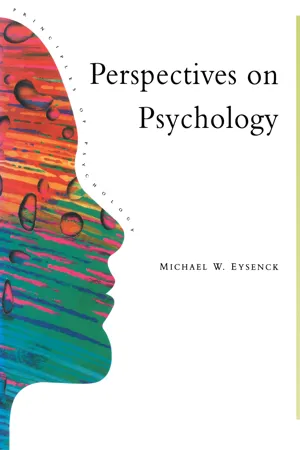Psychology
Features of Science
The features of science in psychology include empirical evidence, objectivity, and testability. Empirical evidence refers to the use of observation and experimentation to gather data. Objectivity involves minimizing bias and personal beliefs in the interpretation of results. Testability means that scientific theories and hypotheses can be tested and potentially falsified through research and experimentation.
Written by Perlego with AI-assistance
Related key terms
1 of 5
6 Key excerpts on "Features of Science"
- No longer available |Learn more
- Theresa White, Donald McBurney(Authors)
- 2012(Publication Date)
- Cengage Learning EMEA(Publisher)
These hubs are scientific disciplines with ideas and sub-groups that cross scientific bound-aries. So, while psychology is distinct from biology, many sub-disciplines, such as animal behavior or neurology, share ideas common to both sciences. To many people it seems that psychology should follow different rules from other sciences because psychology appears by definition to deal with mental events. If you have trouble seeing how psychology can be like the other sciences, don ’ t be discouraged. The experts on psychology took a long time to come to a tentative consensus about how psychology should be done, and the debate is not settled by any means. A third reason for defining science in an introductory discussion of exper-imental psychology is that beginning psychology students sometimes feel that they have become amateur psychologists by virtue of observing human and animal behavior for a lifetime. When you took chemistry, you probably had not spent much time thinking about how atoms combine to form molecules. Yet you may have had a lifetime interest in why people are friendly or unfriendly, moody or not moody, and so forth. Sometimes, too, you know exactly why you do things: “ I wore a certain style of clothes so I would be accepted by my fellow students. ” So your very experience with people may make it more difficult for you to think about human behavior scientifically. Studying human behavior might seem easier if you were the mythical Martian sent to spy on the behavior of earthlings. We often are more aware of the customs of a slightly different culture than we are of our own. Characteristics of Science To tell the truth, it is impossible to define science neatly because it is too com-plex an enterprise. It is not like defining a bachelor as an unmarried male. We science: a way of obtain-ing knowledge by means of objective observations CHAPTER 1 • What Is Science? 7 Copyright 2012 Cengage Learning. - eBook - PDF
What is Psychology?
Foundations, Applications, and Integration
- Ellen Pastorino, Susann Doyle-Portillo, Ellen Pastorino(Authors)
- 2021(Publication Date)
- Cengage Learning EMEA(Publisher)
© Ellen Pastorino Copyright 2022 Cengage Learning. All Rights Reserved. May not be copied, scanned, or duplicated, in whole or in part. Due to electronic rights, some third party content may be suppressed from the eBook and/or eChapter(s). Editorial review has deemed that any suppressed content does not materially affect the overall learning experience. Cengage Learning reserves the right to remove additional content at any time if subsequent rights restrictions require it. CHAPTER 1 The Science of Psychology 4 1.1 What Is Psychology? Welcome to the world of psychology , the scientific study of behavior and mental pro- cesses. But what exactly does that include? Behavior includes actions, feelings, and bio- logical states such as sleeping. Mental processes include problem solving, intelligence, and memory, to name just a few. Psychology is a science because psychologists conduct research in accord with the scientific method—a systematic process used to test ideas about behavior. Psychologists analyze the behavior of humans as well as other species. Psychology is probably one of the few disciplines in which students come to the first class believing they already know much about the topic. We see psychologists and psychiatrists on talk shows and listen to them on the radio. We frequently see them depicted on television and in the movies. Many of these portrayals are quite entertaining, but they do not always represent psychology accurately. As a result, the public image of the discipline tends to be distorted. The purpose of this textbook is to help you develop a deeper understanding of psychology as a science and how the results of psychological research apply to the real world and to your life. In this chapter, we explain what psychologists do, how they think, and where they work. It is a general overview of the field of psychology, an introduction to the more specific areas of psychology discussed in subsequent chapters. - eBook - ePub
- Michael W. Eysenck(Author)
- 2013(Publication Date)
- Psychology Press(Publisher)
The most common way in which scientists (including psychologists) attempt to test their hypotheses is by means of experiments. Although this is frequently the most effective method available, the history of science demonstrates very clearly that scientific progress does not necessarily depend on carrying out laboratory experiments. Consider, for example, the science of astronomy. In spite of the fact that astronomers generally don't carry out experiments in the normal sense, they have been able through careful observation to obtain much valuable information about the nature of the universe.In similar fashion, many important issues in psychology cannot be examined under laboratory conditions. For example, those who have been exposed to traumatic events (events causing a powerful shock) such as a major accident or kidnapping, sometimes subsequently develop a condition known as post-traumatic stress disorder. It is very important for psychologists to try to understand the processes triggering this disorder, but it would be completely unacceptable in ethical terms to attempt to produce this disorder under experimentally controlled conditions.Goals of science
What are the goals of science? As Malim et al, (1992) pointed out, three of the main goals are as follows:- prediction;
- understanding ;
- control.
The theories formed by scientists permit them to make predictions or hypotheses about what will happen in situations that they have not previously investigated. For example, psychologists such as Thorndike discovered that animals could be persuaded to behave in certain ways if their behaviour was followed by reward or reinforcement. This led them to predict that the same would be true of the human species. The success or otherwise of predictions stemming from a theory are of great importance: any theory that generates numerous incorrect predictions must be seriously flawed.Even if a theory generates a large number of accurate predictions, it does not necessarily follow that we will have a good understanding of what is happening. For example, a theory of memory proposed by Craik and Lockhart (1972) included the prediction that memory will be better for material that has been processed in terms of its meaning than for material that has not. Although this prediction has been confirmed experimentally several times, the precise reasons why it is beneficial to process meaning still remain unclear. - eBook - PDF
- Per Saugstad(Author)
- 2018(Publication Date)
- Cambridge University Press(Publisher)
Psychology is a theoretical as well as an applied science, and also a profession incor- porating a number of specialties. In a wide variety of areas it has produced knowledge useful for the solution of theoretical problems as well as problems of practical and social 2 1 Introduction life. However, so far, psychology has hardly produced comprehensive theories or scien- tifically acceptable principles of a general nature. Thus, the discipline appears highly fragmented. The Present Approach to the Study of the History of Psychology The attempt to establish psychology as an empirical science raised several questions that were not easily answered and that soon became controversial. Questions such as what is the relationship between mind and brain, between human and animal behavior, and between genetic endowment and environmental influence (nature and nurture) emerged at the inception of the discipline and have remained controversial to this day. At an early stage, disagreement arose about whether we should conceive of psychology as the study of mental experiences or the study of behavior. In what sense should we regard as mental experiences various types of nonconscious processes, such as the subconscious and the unconscious? How do society and culture influence human thinking and behavior? This last question emerged later in psychology’s history and is of central importance for the advancement of psychology as an empirical science. When controversial questions such as these have been satisfactorily answered, psy- chology will be considerably advanced. I believe a critical, historical examination of them can contribute to their conceptual clarification. For this reason, I give the study of its history a central place in the general study of psychology. - eBook - PDF
Research in Psychology
Methods and Design
- Kerri A. Goodwin, C. James Goodwin(Authors)
- 2016(Publication Date)
- Wiley(Publisher)
That is, theories must generate hypotheses producing research results that could come out as the hypothesis predicts (i.e., support the hypothesis and increase confidence in the theory) or could come out differently (i.e., fail to sup- port the hypothesis and raise questions about the theory). Research that consistently fails to sup- port hypotheses derived from a theory eventually calls a theory into question and can lead to its modification or outright abandonment. To sum up this section on science as a way of knowing, research psychologists can be described as “skeptical optimists.” They are open to new ideas and optimistic about using scientific meth- ods to test these ideas, but at the same time they are tough‐minded—they won’t accept claims without good evidence. Also, researchers are constantly thinking of ways to test ideas scientifi- cally, they are confident that truth will emerge by asking and answering empirical questions, and they are willing (sometimes grudgingly) to alter their beliefs if the answers to their empirical questions are not what they expected. One final point. Although we have been describing the attitudes and behaviors of psychologi- cal scientists, it is important to realize that virtually all of the points made in this section of the chapter are relevant to you as a developing critical thinker. To reiterate a point made earlier, it is not essential for you to become a researcher for the lessons of this book to have value for you. All of us could benefit from using the attributes of scientific thinking to be more critical and analyti- cal about the information we are exposed to every day. Psychological Science and Pseudoscience Because everyone is interested in human behavior, it is not surprising that many claims are made about its causes and inner workings. - eBook - PDF
Psychology
A Self-Teaching Guide
- Frank J. Bruno(Author)
- 2002(Publication Date)
- Wiley(Publisher)
2 Research Methods in Psychology: Gathering Data 17 PREVIEW QUIZ True or False 1. T F Forming a hypothesis is an important step in the scientific method. 2. T F Naturalistic observation is characterized by the use of a control group. 3. T F The clinical method is a research technique associated primarily with the treatment of individuals with mental or behavioral disorders. 4. T F The testing method explores human behavior by using psychological tests of attributes such as intelligence, personality, and creativity. 5. T F The experimental method is flawed as a method because it provides no way for a researcher to obtain control over variables. (Answers can be found on page 28.) In the opening chapter you learned that scientific psychology has four explicit goals—to describe, explain, predict, and control behavior. In order to accomplish these goals it is essential to employ effective research methods. In this chapter you will become familiar with the principal ways in which psychologists gather data and put the scientific method to work. Objectives After completing this chapter, you will be able to • describe the three main steps in the scientific method; • identify the principal research methods used by psychology; • recognize some of the advantages and disadvantages of the various research methods; • understand the difference between a positive and a negative correlation; • specify key concepts associated with the experimental method. The Scientific Method: Do the Facts Support Your Educated Guess? In the days of psychology’s long philosophical past, the method used to investigate the behavior of human beings was rationalism. This is the point of view that great discoveries can be made just by doing a lot of hard thinking. This is still a workable approach in some fields of philosophy, and it has certainly been a work- able method in mathematics. In psychology, however, rationalism alone can lead to contradictory conclu- sions.
Index pages curate the most relevant extracts from our library of academic textbooks. They’ve been created using an in-house natural language model (NLM), each adding context and meaning to key research topics.





